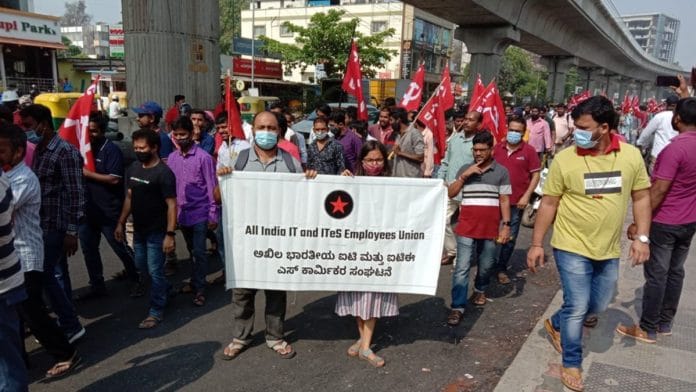Bengaluru: Half an hour after he reported to work, an IT employee from Bengaluru learned that he had been laid off. “This is to inform you that today is your last working day,” read the email, which he said was sent with no prior notice from his employer, the beleaguered ed-tech startup, Byju’s. It was also the day he learned that there was a union for people like him—the All India IT and ITeS Employees’ Union or AIITEU.
That was in November 2023. Since then, the Karnataka chapter of AIITEU has been helping him fight for his full and final settlement. The last 10 months have been a blur of paperwork, red tape, and hearings at the Karnataka Labour Court.
Trade unions in the booming IT sector have been viewed as an oxymoron in the new India Story. There was an air of exceptionalism that pervaded the IT industry. It brought dizzying growth, glory, foreign exchange, and prestige. Its global connectedness meant working across time zones with overseas clients and bosses, and impossibly ambitious deadlines. This wasn’t the old India of Inspector Raj and labour unions—the outdated rules didn’t apply to the flat, new world.
So, even the idea of unions was anathema. It was seen as an unnecessary vestige of an era that held business back. Small efforts were made in fits and starts by IT employees in the past three decades, but it never really gained ground in the larger Bengaluru narrative.
But unravelling bankruptcy and massive layoffs at Byju’s have acted as the latest accelerator for the unionising mindset. It comes at a time when AI is set to catapult Bengaluru’s IT sector to the next phase even as fears of job loss mount. It also coincides with the US, where employees of Amazon, Microsoft, Alphabet, and other big firms have begun unionising.
For industry leaders here, it’s proving to be an irritation.
Unions are an anachronism that have helped workers realise their rights in the formative years, but have now overstayed their welcome.
—TV Mohandas Pai, former HR head and ex-chief financial officer at Infosys
“These are just distractions that will come up if leaders—and employees—are not delivering their goals,” said Ankush Sabharwal, tech entrepreneur and CEO of CoRover, an AI platform based in India. “Employees should instead focus on their responsibilities within the company.”
Formed in Kolkata in 2018, AIITEU (affiliated to the Centre of Indian Trade Unions) has been demanding better and fairer working conditions for everyone employed in the IT and ITeS industry. Since 2021, when it started a chapter in Bengaluru—the beating heart of the IT sector—it’s been butting heads with tech giants, lesser-known firms and startups, and even the Karnataka government. Its members want better working conditions, benefits, and stronger legal protections for the IT sector’s workforce.
“We have to clear their [IT workers’] misconception that [they] cannot be touched. Only once they realise how vulnerable they are, will they see unions as relevant,” said Suman Dasmahapatra, founder of the Karnataka chapter of the union. He wants to correct the impression that everyone in the IT sector gets paid “hefty amounts” and lives a luxurious life.

“There is a class consciousness within the industry that also dictates the work environment within a company.”
The crux of the fight is the definition of the word ‘worker’ and the inclusion of the IT sector in the Industrial Employment (Standing Orders) [IE(SO)] Act, 1946. Karnataka is the only state in the country that has exempted the sector from the Act’s ambit. The more than a decade-old debate has reignited.
The 400-member-strong Bengaluru AIITEU with no office has taken on a sector that propels the state’s economy. As of 2022, Karnataka had around 1,500 IT firms and exported software worth Rs 6.3 lakh crore—about 40 per cent of India’s total exports.
“The exemption from the IE(SO) Act is an ease of doing business issue. It is important to understand that the exemption does not dilute protection to the employees,” said Ashish Aggarwal, head of public policy at NASSCOM in a statement to ThePrint.
Industry perspective
In India, industry leaders like Infosys and Tata Consultancy Services recognise the rights of their workers to freely organise themselves. According to Dasmahapatra, they are among the few companies that are more “liberal” in their way of thinking and do not oppose their employees joining unions.
But for the most part, the IT sector is circumspect about the role of unions.
ThePrint’s mails to NASSCOM about the role of IT unions went unanswered. However, Kiran Karnik, former president of NASSCOM, had earlier publicly said that union formation will not succeed in the IT industry as “[IT professionals] are well paid and have access to top management of respective companies. Given their condition, there is no need for trade unions.”
Efforts to form a union in 2017 were also met with criticism, with Mohandas Pai calling it a “hype and fear-mongering”.
“Unions are an anachronism that have helped workers realise their rights in the formative years, but have now overstayed their welcome,” he told ThePrint. He used the example of the Great Bombay Textile Strike of 1982, when over 2.5 lakh workers put down their tools. It lasted for over a year, leading to the mills being shut down, which ultimately changed the social, cultural, and economic fabric of Mumbai forever.
“The trade union agitation prevented the formal [economic] growth of the textile industry in the state and eventually destroyed it,” said Pai.
Industry leaders also question the relevance of unions in a sector where job mobility is high. Currently, the attrition rate of the IT industry stands at 10-15 per cent, Pai said. Employees are leaving organisations very frequently and there are more job opportunities, allowing people to switch easily.
However, he agreed that many employees are facing challenges within the industry. “The compensation for entry-level jobs doesn’t meet the current demand,” Pai said. “We are increasingly seeing top college graduates not opting to work for IT companies because of low wages,” he added.
In India and across the world, even behemoths like Google, Amazon, and IBM are laying off employees. In 2021, more than 400 engineers and other employees at Google announced they were forming a union in the US.
We are increasingly seeing a trend where actions of smaller startup companies with 20-50 employees are going unnoticed and unscrutinised.
—Nihira, AIITEU member
Shubham Chauhan, associate director at Unacademy, acknowledged that the sector is in a state of flux with the rise of AI, economic pressures, and waning investor support. The ed-tech company laid off 250 employees in its latest round of restructuring in July. Most were from marketing, sales, product, and business teams.
But the company’s focus is only on the future now: Consistently delivering results in the K-12 segment. “While [rise of] AI can assist in strategy development, data analysis, identifying adoption gaps, and even improving teaching methodologies to some extent, it cannot fully replace the personal connection and mentoring that educators provide,” Chauhan said.
There are fears that strong unions and strikes will deter foreign investment.
Sripalji Bachawat, director at C-Square Info-Solutions, a Bengaluru-based software and solutions company, used the Samsung workers’ strike in Chennai to argue his point. More than 1,000 Samsung workers have been on strike since 9 September, demanding wage hike, union recognition, and an eight-hour workday. The company, in response, reiterated that the average monthly salary of their full-time manufacturing workers at the Chennai plant is 1.8 times the average salary of similar workers employed at other companies in the region.
“Eventually such [union] activities will deter big companies from doing business in India,” said Bachawat. He added that while unionisation efforts are “acceptable” to an extent if they help in implementing existing worker welfare policies, “they must not transform into rebel activities.”
Also read: Patiala RGNUL students want V-C resignation at all costs. They won’t have their voices muzzled
Ex-employees stuck in limbo
Over 20 people gathered in a small hall at Aashirvad Community Centre in Bengaluru’s Central Business District for the July meeting of AIITEU.
“Do not resign!” union member Tanmay Pereira exhorted the small group, before expanding on their “basic rights”.
“We are seeing more firing than hiring. But if you are being laid off, do not resign willingly. Termination provides legal protection and strengthens your position,” he said.

Many were hearing this for the first time and jotted down notes as they ran through the points. It’s unofficially called the ‘laid-off guide’—steps employees must take to protect themselves. ‘Unity among employees can deter companies from resorting to termination or layoffs,’ one such point said.
“We are increasingly seeing a trend where actions of smaller startup companies with 20-50 employees are going unnoticed and unscrutinised,” said a union member Nihira.
The union doesn’t have a designated office space where members can congregate. So, every space of resistance in the city from Freedom Park to Cubbon Park offers an opportunity to deliberate on IT workers’ rights.
The bureaucratic rigmarole involved in seeking justice and compensation from labour courts deters entry-level employees including salespersons and data entry operators from seeking redressal.
The former Byju’s employee has a long battle ahead of him.
While Karnataka Labour Minister Santosh Lad recently urged the parent company of Byju’s, Think and Learn, to settle its dues as soon as possible, the ed-tech firm has declared insolvency. With the case still ongoing, officials from Byju’s said that there hasn’t been much progress on clearing outstanding dues yet.
The former employee is desperate for another job, but without the experience and relieving certificates—two important documents— he’s been unable to even apply for another job.
“The company tried to reconcile with me by offering four months-worth of compensation. But I have been unemployed for six months. I have five dependents in my family who solely rely on my income. So I decided to stand my ground and fight the case in the court,” he said.
Another union member, Tamoghana, joined the Karnataka chapter of the union in 2021 when he was employed as a software engineer at a firm in Bengaluru.
He was 27 at the time and earned Rs 15,000, nearly half of which was spent on rent. But when he decided to quit due to low pay, like the former Byju’s employee, he was not given his relieving letter, experience certificate, and full and final settlement, despite working there for over a year. His case was delayed multiple times before the labour department. In the end, the commissioner asked him to approach a higher court as the company wasn’t cooperating with the case.
Like the former Byju’s employee, Tamoghana is in limbo. He has applied for a job in another IT company, but can’t join without his relieving letter and experience certificate. With no funds to continue fighting for his dues, Tamoghana has decided to “stay silent—for now”.
There is rarely a shortcut or easy resolution. Nihira recalled how she, along with other union members, had to wait at the labour commissioner’s office for hours just for an update on an employee’s case. The process is cumbersome, expensive, and demoralising.
Labour department officials, however, countered this claim.
“Multiple cases of illegal termination and delayed payment of wages, among others, have been filed under the Industrial Disputes Act. There is no delay in dealing with these cases. We are resolving them … it takes time,” said G Manjunath, Additional Labour Commissioner (Industrial Relations).
Also read: Urdu is the ticket to a govt job in this Rajasthan village. Even more than English
A legal matter
On any given day, there’s a protest outside the office of the Labour Commissioner in Bengaluru’s Central Business District. Domestic workers, garment workers, IT workers—all of them demanding fair working conditions. Inside the department, officials are almost hidden under a mountain of files and documents—neatly stacked towers of labour disputes on desks.
While the Industrial Disputes (ID) Act, 1947 protects workers in industries, the debate over whether an IT employee is ‘workman’ enough takes centre stage during labour disputes. To claim rights under the ID Act, an employee in the IT sector would have to show that they are a worker, and their employer company is an industry.
The exemption from the IE(SO) Act is an ease of doing business issue. It is important to understand that the exemption does not dilute protection to the employees.
—Ashish Aggarwal, head of public policy at NASSCOM
An IT employee in an administrative or supervisory role is not considered a ‘workman’, so they can’t seek redressal under the Industrial Disputes Act.
The courts have also weighed in on this debate, acknowledging that the concept of the workman is no longer restricted to a blue-collared person, and extends to white-collared people in the workforce.
“A couple of decades ago, an industry would have meant only a factory, but today industry includes software and hardware industry, popularly known as the Information technology industry,” the Karnataka High Court said in the case of Commissioner of Income Tax v. Texas Instruments India Pvt Ltd, 2021, which came as a win for employees in the industry.
There is another catch—the IT sector doesn’t even come under the ambit of the state’s labour department. This is one of the largest fights that IT unions have been fighting for several years.
Karnataka is the only state in the country that has exempted the IT industry from the Industrial Employment (Standing Orders) [IE(SO)] Act, 1946. The IE (SO) Act spells out the rules to be followed regarding employee recruitment, working hours, attendance, the procedure for availing leave and other benefits, and termination, among other workers’ rights.
According to the state labour department, the IT industry is a “sunrise industry” and that the exemption from IE(SO) Act will help accelerate their growth in Bengaluru and the rest of the state. The argument is that the exemption grants flexibility to companies to determine and implement policies, frameworks, and facilities that will then help the industry meet international standards.
The IT sector has lauded the move. Aggarwal said in his statement that it would help the industry achieve its twin objectives of enhancing the ease of doing business in India and generating employment in Karnataka.
“Even with the exemption, all existing labour laws (like social security, conditions of employment, termination of employment, dispute resolution, safe workplace for women employees) continue to apply to the IT sector,” he said.

In May 2019, the Karnataka government extended the exemption of the IT sector from the IE(SO) Act for a period of five years. As the deadline to revisit the exemption approached, unions were assured that their demands would be taken into consideration.
The government even contemplated discontinuing the exemption and cited instances of unfair trade practices such as ID blocking, mass retrenchment, layoffs, extended work hours, and sexual harassment at the workplace as reasons behind doing so. But on 10 June, the Karnataka government extended the exemption for another five years.
Unions like AIITEU and Karnataka State IT/ITeS Union (KITU) have organised multiple protests against this with little success. According to Additional Labour Commissioner Manjunath, the exemption is conditional. IT companies are still required to intimate the labour department regarding cases of disciplinary action, termination, dismissal, etc.
“Despite the exemption, IT companies are still covered under other labour laws like the State Shops and Commercial Establishments Act, the Minimum Wage Act, the Industrial Disputes Act, and the Sexual Harassment at Workplace (Prevention, Prohibition and Redressal) Act,” he said.
Also read: Haryana farmers are rethinking rice after September rain. Carrots, ginger, turmeric?
The IT union’s story
The AIITEU wants employees here to tap into the power of collective bargaining as well. The Trade Unions Act, 1926 allows IT employees to form unions, ensuring representation and collective bargaining. It stems from Article 19(1)(c) of the Constitution, which grants citizens the right to form associations.
“These kinds of unionisation efforts are very important. They help employees realise their rights,” said AH Umesh, deputy labour commissioner of Bengaluru.
Bengaluru is the third chapter of the AIITEU, which has a presence across India, from Delhi to Pune. When it started out, there were only seven employees—coders, software engineers, and consultants–from IT companies as part of its initial team. Today, it has five office bearers and more than 400 members in Karnataka.
But that’s just a drop in the ocean. Having launched the chapter in the throes of the pandemic, Dasmahapatra and the core team were restricted to holding their initial meetings online. Members utilised social media platforms like Twitter and Instagram, and even used the blogging platform Medium to educate employees.
“We have seen an increase in membership in the past two years, especially with the latest trend of layoffs by startups,” said Dasmahapatra, who never quite cut ties with his Left-wing political activities during college days in Kolkata. He started working with migrant and gig workers while also managing his job responsibilities. Apart from the IT union, he is also the coordinator of the Bengaluru chapter of All India Gig Workers.
AIITEU is funded entirely by membership dues—Rs 150 per year, per member—and voluntary financial contributions by members. From time to time, they also run crowdfunding campaigns among non-members.
Many members prefer to keep their union membership private, fearing harassment from their seniors. An IT employee who wished to join a union recalled the mass suspension of more than 80 workers from Indian Telephone Industries (ITI) Limited after they formed a union in 2021. The dismissed workers have continued to protest outside the gates of ITI until today.
“This can happen to us too. So we just choose to keep quiet. We cannot afford to not have this job,” an IT employee said on the condition of anonymity.
AIITEU in Karnataka and other parts of the country has managed to sow some seeds of success against the power dynamics of the IT industry. When the Karnataka government proposed an amendment to facilitate a 14-hour workday for IT employees last month, more than 800 employees took out protest marches. The plan was put on the backburner after massive resistance from unions.
Unionisation efforts in Kerala forced Byju’s to rescind its decision of mass layoffs in 2022 and in Kolkata, they forced Teleperformance Global Services Pvt Ltd to withdraw termination slips to more than 300 employees from its Sector V office in 2020.
Meanwhile, industry leaders and experts who have written off 2024, are expecting significant positive changes within the tech sector in the next few years. The IT industry has weathered storms in the past.
“Many startup and tech companies were chasing just one type of business growth model, which led to employees being replaced,” observed Bachawat. “However, the next five to ten years will bring good revenue prospects for the industry with the rise of AI and the opportunities it will bring,” he said.
Public-private partnerships in the tech sector are only expected to increase in the next few years. Unionisation efforts only serve as a ‘bandage’ for a temporary problem, said Sabharwal.
“If employees are unionising, then there are issues with the foundation of the company that the leaders must address.”
(Edited by Prasanna Bachchhav)






